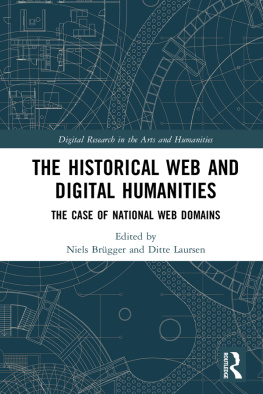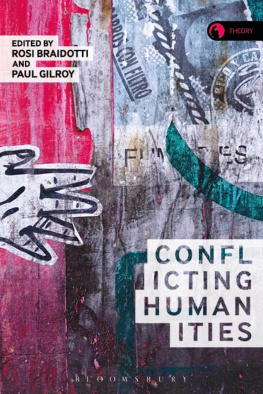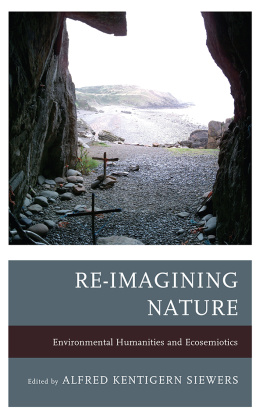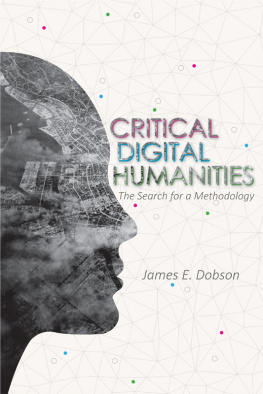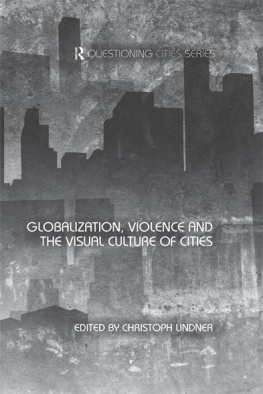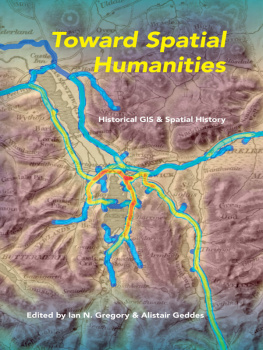The Humanities between Global Integration and Cultural Diversity
Concepts for the Study of Culture
Edited by Doris Bachmann-Medick, Horst Carl, Wolfgang Hallet and Ansgar Nnning
Editorial Board
Mieke Bal, Hartmut Bhme, Sebastian Conrad, Vita Fortunati, Isabel Gil, Lawrence Grossberg, Richard Grusin, Hans Ulrich Gumbrecht, Ursula Heise, Claus Leggewie, Helmut Lethen, Christina Lutter, Andreas Reckwitz, Frederik Tygstrup and Barbie Zelizer
Volume 6
ISBN 978-3-11-044075-1
e-ISBN (PDF) 978-3-11-045218-1
e-ISBN (EPUB) 978-3-11-045111-5
ISSN 2190-3433
Library of Congress Cataloging-in-Publication Data
A CIP catalog record for this book has been applied for at the Library of Congress.
Bibliographic information published by the Deutsche Nationalbibliothek
The Deutsche Nationalbibliothek lists this publication in the Deutsche Nationalbibliografie;
detailed bibliographic data is available in the internet at http://dnb.dnb.de.
2016 Walter de Gruyter GmbH, Berlin/Boston
www.degruyter.com
Preface
Global Integration and Cultural Diversity under this topical heading the opening conference of the Humanities Research Center at the international Jacobs University in Bremen, Germany (2012), studied the role of the humanities, including the social sciences, at the threshold of modernization and globalization. It engaged anew with both the socio-historical and theoretical entanglements of modernity and globalization and made them readable within the broader field and framework of cultural studies. The inaugural conference of the Humanities Research Center at Jacobs University was an opening move, heralding further research on the transformation of the humanities between global integration and cultural diversification. Its course-setting findings, which point towards a shift from modern to global humanities, are presented in this volume.
All those who have invested their intellectual commitment, academic proficiency, lifeblood, personal energy, and practical skills to bring this book to fruition deserve the greatest credit and our sincere gratitude. Our first thanks go to the contributors of this volume for their passion for such a complex topic and their patience during the editing process. Included in the same heartfelt thanks is Owen Gurrey who has coordinated the communication between authors and editors and has given us the benefit of his exceptional gift for language to polish the style of individual contributions. We owe a special debt of gratitude to Doris Bachmann-Medick, who warmly endorsed our book project from the start and opened the door for its publication in the GCSC series Concepts for the Study of Culture with De Gruyter. Last but not least we would like to express our thanks to the De Gruyter publishing house, in particular Manuela Gerlof and Stella Died-rich, for professional and efficient collaboration, and the German Fritz Thyssen Foundation for their generous financial support of the conference event and the printing of this publication.
We are full of hope that this volume will change and diversify the ways in which research in the humanities will be undertaken in the future. It is published in tribute to the Humanities at Jacobs University in Bremen, whose study programs have been closed down for economic reasons, while worldwide humanities departments are on the rise due to the unexpected and enduring power of local cultures in an age of globalization.
Bremen, May 2015
Birgit Mersmann and Hans G. Kippenberg
Birgit Mersmann and Hans G. Kippenberg
Introduction: Reconfiguring the Humanities
In the last decades, the disposition and structure of the humanities historically formed in the age of modernity has come under scrutiny. Pushed by digitization and globalization, the humanities were forced to reorient and reimagine themselves. The relationship dynamics between global integration and cultural diversification constitutes the guiding force for observing the reconfiguration of the humanities under the impact of globalization. What changes in orientation have already taken place in and between different disciplines and areas of research over the course of recent cultural, economic, and scientific globalization? What new topics and methods have evolved? How can the humanities in conjunction with the social sciences develop and flourish in-between fragmentation, pluralization and homogenization?
For historical and systemic reasons, our point of access in studying the transformation of (and within) the humanities is the radical societal change actuated by a political revolution and a media revolution the collapse of the ruling orders in the East after the fall of the Iron Curtain in 1989/1990 and the emergence of the world wide web as a new digital tool for global integrative networking. New models of representation emerged alongside an ever expanding globalized capitalist system and the fractured fields of the humanities were left to wonder at this process of assimilation. Concepts such as global connectivity, network society, and cultural homogenization/diversification appeared as watchwords of the digital revolution. New digital territories and transnational networks were created, accelerating the rise of English as the one global language. The traversing of the globe by instantaneous communication has enabled flows of capital, people, goods, beliefs, fashions, knowledge, crimes, and drugs. This extra-spatial exchange has opened up a whole raft of identity models and sites for cultural, social as well as political conflict. It has given rise to the idea of cultural globalization and has caused a reappraisal of the concept of modernity.
The connector and fusing global integration with cultural diversity in the title is indicative of the primary goal of this book: It intends to explore new ways to join global studies and diversity studies in the intersecting fields of humanities and social sciences. At the base of this constructive fusion lies a bias, an opposition that has dominated the academic discourse on globalization since its inception and still haunts many minds. It is best formulated by quoting Arif Dirlik who has introduced the concept and condition of global modernity in his book Global Modernity: Modernity in the Age of Global Capitalism : Is the world unifying, creating a common organizational structure and a new culture to bolster it, or is it fragmenting into units of various kinds and sizes that are at odds with one another and themselves fractured in many ways internally? (Dirlik 2007, 1) In Dirliks view, there is no clear-cut answer to this either/ or question. The world we live in is too complicated to lend itself to this sort of teleological one-way answer. It is both unifying and fragmenting. (Ibid.) The concept of global modernity justly reflects the tense intertwining, uneven, often conflictual relationship between unifying and fragmenting tendencies, between convergence and divergence, compliance and conflict.
The peculiar unease embodied by the notion of global modernity, in particular the singular version that Dirlik favors over the plural, also mirrors the knotty, intricate relation between modernization and globalization. With the discourse on globalization, a new theoretical setting and resource of interdisciplinary and intercultural dialogue for revisiting and reevaluating modernity and modernization theory is available. In order to prove its legitimacy, globalization theory, as diverse as it is, cannot avoid positioning itself in relation to modernization theory, be it in opposition to or conjunction with it. Consequently, globalization is set as both a continuation and disavowal of an earlier modernization. For one scholarly fraction, most prominently represented by Giddens (1990), globalization is a socio-historical consequence of modernity as the onset of capitalism. For other interpreters, such as Robertson, globality is inherent in modernity, it is not primarily a cause, but a condition of what he calls divergent modernization. (Robertson 1992) The contrary position, prominently advocated by Jan Nederveen Pieterse (2004), rejects the idea that globalization is a condition of modernization. Therein, globalization is regarded as a historical epoch contemporaneous with the era of postmodernism taking shape in the 1960s. True globalization theory therefore requires a postmodern analysis of cultural hybridization. Yet others such as Friedman (2005) believe in the premodernity of globalization. They are convinced that globalization predates the modern; that is, while being part of the development of ancient civilizations, globalization is civilizational in nature. (Featherstone/Lash/Robertson 1995, 6) The teleological principle apparently immanent in the concept of globalization as a dynamic process has not only led to various speculations about the historical beginning of the process of globalization the set times include antiquity, the 1500s, 1800s, 18701920s, 1960s, 1989 , but also raised opinions about its ending. The theory of post-globalism prevalent since the turn of the millennium states that the reawakened nationalism and protectionism, localism and fundamentalism appear to define an epoch of radical deglobalization, the disintegration of the liberal world and the demise of globalism. (McGrew 2007, 38)


